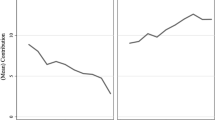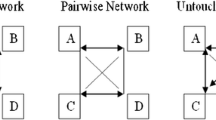Abstract
Recent experiments have shown that voluntary punishment of free riders can increase contributions, mitigating the free-rider problem. But frequently punishers punish high contributors, creating “perverse” incentives which can undermine the benefits of voluntary punishment.
In our experiment, allowing punishment of punishing behaviors reduces punishment of high contributors, but gives rise to efficiency-reducing second-order “perverse” punishment. On balance, efficiency and contributions are slightly but not significantly enhanced.
Similar content being viewed by others
References
Axelrod, R. (1986). An Evolutionary Approach to Norms. American Political Science Review, 80(4), 1095—1111
Bochet, O., Page, T., & Putterman, L. (2006). Communication and Punishment in Voluntary Contribution Experiments. Journal of Economic Behavior and Organization, 60,11—26
Carpenter, J., & Matthews, P. (2002). Social reciprocity. Middlebury College Department of Economics Working Paper #29
Cinyabuguma, M., Page, T., & Putterman, L. (2004). On Perverse and Second-Order Punishment in Public Goods Experiments with Decentralized Sanctioning. Brown University Department of Economics Working Paper 2004-12
Davis, D. D., & Holt, C. (1993). Experimental economics. Princeton: Princeton University Press
Ertan, A., Page, T., & Putterman, L. (2005). Can Endogenously Chosen Institutions Mitigate the Free-Rider Problem and Reduce Perverse Punishment? Department of Economics Working Paper, Brown University 2005-13
Fehr, E., & Fishchbacher, U. (2004). Third-party Punishment and Social Norms. Evolution and HumanBehavior, 25, 63—87
Fehr, E., & Gächter, S. (2000). Cooperation and punishment. American Economic Review, 90, 980—994
Henrich, J. (2004). Cultural Group Selection, Co-evolutionary Processes and Large-Scale Cooperation. Journal of Economic Behavior and Organization, 53(1), 3—35
Henrich, J., & Boyd, R. (2001). Why People Punish Defectors: Weak Conformist Transmission can Stabilize Costly Enforcement of Norms in Cooperative Dilemmas. Journal of Theoretical Biology, 208, 78—89
Ledyard, J. (1995). Public goods: A Survey of Experimental Research. In J. Kagel and A. Roth (Eds.), Handbook of Experimental Economics, (pp. 111—94). Princeton: Princeton University Press
Nikiforakis, N. (2004). Punishment and Counter-punishment in Public Goods Games: Can we Still Govern Ourselves? unpublished paper, Royal Holloway, University of London
Ostrom, E. (1992). Governing the commons. New York: Cambridge University Press
Ostrom, E., Walker, J., & Gardener, R. (1992). Covenants with and without a sword: Self Governance is Possible. American Political Science Review, 86(2), 404—416
Ostrom, E., Gardner, R., & Walker, J. (1994). Rules, Games and Common-Pool Resources. Ann Arbor: University of Michigan Press
Page, T., Putterman, L., & Unel, B. (2005). Voluntary Association in Public Goods Experiments: reciprocity, Mimicry, and Efficiency. Economic Journal, 115, 1032—1053
Saijo, T., & Nakamura, H. (1995). The ‘spite’ Dilemma in Voluntary Contribution Mechanism Experiments. Journal of Conflict Resolution, 38(3), 535—560
Sefton, M., Shupp, R., & Walker, J. (2002). The Effect of Rewards and Sanctions in Provision of Public Goods. Working Paper, University of Nottingham and Indiana University
Somerville, J., & Santoni, R. E. (eds.) (1963). Social and Political Philosophy: Readings from Plato to Gandhi. Garden City, NY: Anchor Books
Author information
Authors and Affiliations
Corresponding author
Additional information
JEL Classification C91 · C73 · C41 · D71
Rights and permissions
About this article
Cite this article
Cinyabuguma, M., Page, T. & Putterman, L. Can second-order punishment deter perverse punishment?. Exp Econ 9, 265–279 (2006). https://doi.org/10.1007/s10683-006-9127-z
Received:
Revised:
Accepted:
Issue Date:
DOI: https://doi.org/10.1007/s10683-006-9127-z




